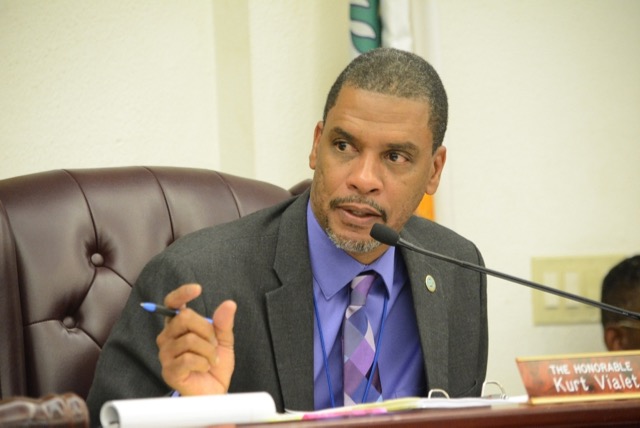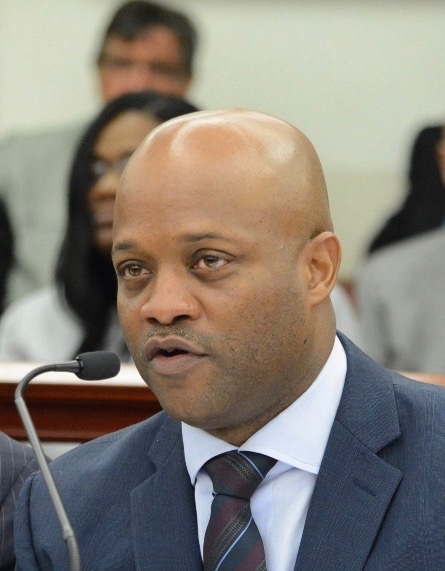
Finance Committee members approved a bill adding new taxes on tobacco, alcoholic beverages and sodas, and replacing a difficult to enforce time share rental tax with a set per-night fee of $25. They also approved another bill setting a floor of $360 on real property bills, regardless of homestead and other exemptions.
"I don’t like where we are. Nobody likes where we are," Finance Committee Chairman Kurt Vialet said at the beginning of the hearing.
"While we are not in the business of over-taxation, the government has obligations it is required to meet," he said.
The bills were modeled on legislation Gov. Kenneth Mapp recently submitted to the Legislature aimed at starting to close persistent, large structural budget deficits. These include measures he proposed in December, for tobacco and alcohol tax increases and fees on time shares, and are part of a five-year plan aimed at reassuring creditors as well as improving the territory’s bottom line.
The Senate voted down the tax increases in December, with several senators saying they wanted to hear from the business community before acting. (See Related Links below.) Then, on Jan 11, the territory tried to sell bonds to balance the current year’s budget but had to abort the offering due to a lack of sufficient interest from investors.
Since then, all three major credit ratings agencies have downgraded V.I. bond debt and some financial analysts have begun openly saying they are concerned the territory may be headed down the path of neighboring Puerto Rico, which has effectively been taken over by a federal oversight board due to bond defaults.
In his annual State of the Territory address Monday, Mapp urged the Legislature to act on the measures quickly, to help address an ongoing structural deficit of $130 million to $170 million per year. (See: Mapp Pushes Senate to Enact Reforms to Save the Territory)
Senators cut Mapp’s proposed new excise taxes by half and the timeshare fee to $25 from the $30 per night’s rental, proposed by the governor as an effort to compromise with representatives of the time-share industry who warned that the new fees might drive business elsewhere.
Administration officials decried the reduction, saying it hurt credibility and government finances, while representatives of the business community decried the smaller increases, saying it would not raise as much as projected because it would drive business away.
Finance Commissioner Valdamier Collens told the committee that the changes to the bill appeared to reduce the revenue it would generate by about $17.7 million, compared to Mapp’s proposals. Mapp’s proposals in these two areas were projected to generate about $50 million per year.
Collens said investors had indicated there was a lack of confidence the V.I. government would really take the steps necessary to implement the administration’s five-year deficit reduction plan.
"The bottom line is there is a general lack of trust from the investment community that the government will have the political courage to enact legislation to authorize the tax revenue initiatives outlined in the five-year plan or undertake what may be necessary administratively however unpopular, to remedy its fiscal crisis," Collens said.
"Regrettably," the decision to amend the proposals, decreasing revenues by $17-plus million "may be perceived as demonstrable evidence of these investor concerns," Collens said. The Legislature also removed a provision setting aside most of the timeshare fee revenue to pay employees affected by an 8 percent pay cut in 2011 and 2012.
A recent federal court decision determined the pay cut, enacted by the Legislature during a fiscal crisis, was improper. But no court has ordered the government to reimburse the cuts. Collens said the change meant the government would not have a funding source to pay those employees.
Representatives of the territory’s two chambers of commerce, hotel and restaurant associations, the time share industry, liquor and soda distributors, and Christiansted businesses all vehemently opposed all the tax increases.
Richard Berry, president of liquor distributor Bellows International, said the proposed excise taxes would amount to 222 percent on domestic beer, 192 percent on imported beer and 167 percent on tobacco. Berry said the USVI already has the highest taxes on beer under the U.S. flag and the increases "would have a major negative impact on our economy."
According to the Tax Foundation, Tennessee has the highest tax on beer, at $129 per gallon. The proposed tax on domestic beer of $6.08 per case of 12 ounce containers would bring the V.I. tax to $2.70 per gallon.
Robert Clements, vice president for regulatory affairs for the American Resort Development Assoc., said the timeshare fee will hurt the industry.
"We recognize that the Virgin Islands is facing dramatic fiscal problems … but there is a point where impact fees have a very negative impact on demand," Clements said.
St. Thomas attorney George Dudley compared the fee to charging a homeowner $25 per night to stay in his own home, after charging property tax. A timeshare owner who resides in the unit would not pay the fee; only those renting out the units pay it.
Dudley also said the loss of revenue as a result of the 2012 closing of the Hovensa refinery was the root of the fiscal crisis.
"We all know the closing of the refinery is costing this government $100 million a year at a minimum. I think it is closer to $125 million and I used to represent them," Dudley said.
"It is not possible that the private sector today can replace the $100 million a year the refinery was generating. … At some point this government has to think about how to restructure. … At some point we need to acknowledge we can’t afford the government we have," Dudley said.
Sen. Positive Nelson said it was time to think about legalizing and taxing marijuana, which he said could generate tens of millions of dollars in new revenue. He asked how much legalization could generate and Collens said he did not have figures but it could be "substantial."
According to the Denver Post, the state of Colorado generated $180 million in tax revenue from sales of nearly $1.2 billion in 2016, out of a $6.7 billion nationwide annual legal marijuana industry.
Senators amended the property tax bill to raise the minimum property tax bill from $300 to the $360 originally proposed by Mapp, then voted to send both bills out of committee to the Rules and Judiciary Committee. Voting yes were Vialet, Sens. Marvin Blyden, Neville James, Nereida "Nellie" Rivera-O’Reilly and Brian Smith. Voting no were Sens. Tregenza Roach and Dwayne DeGraff.






